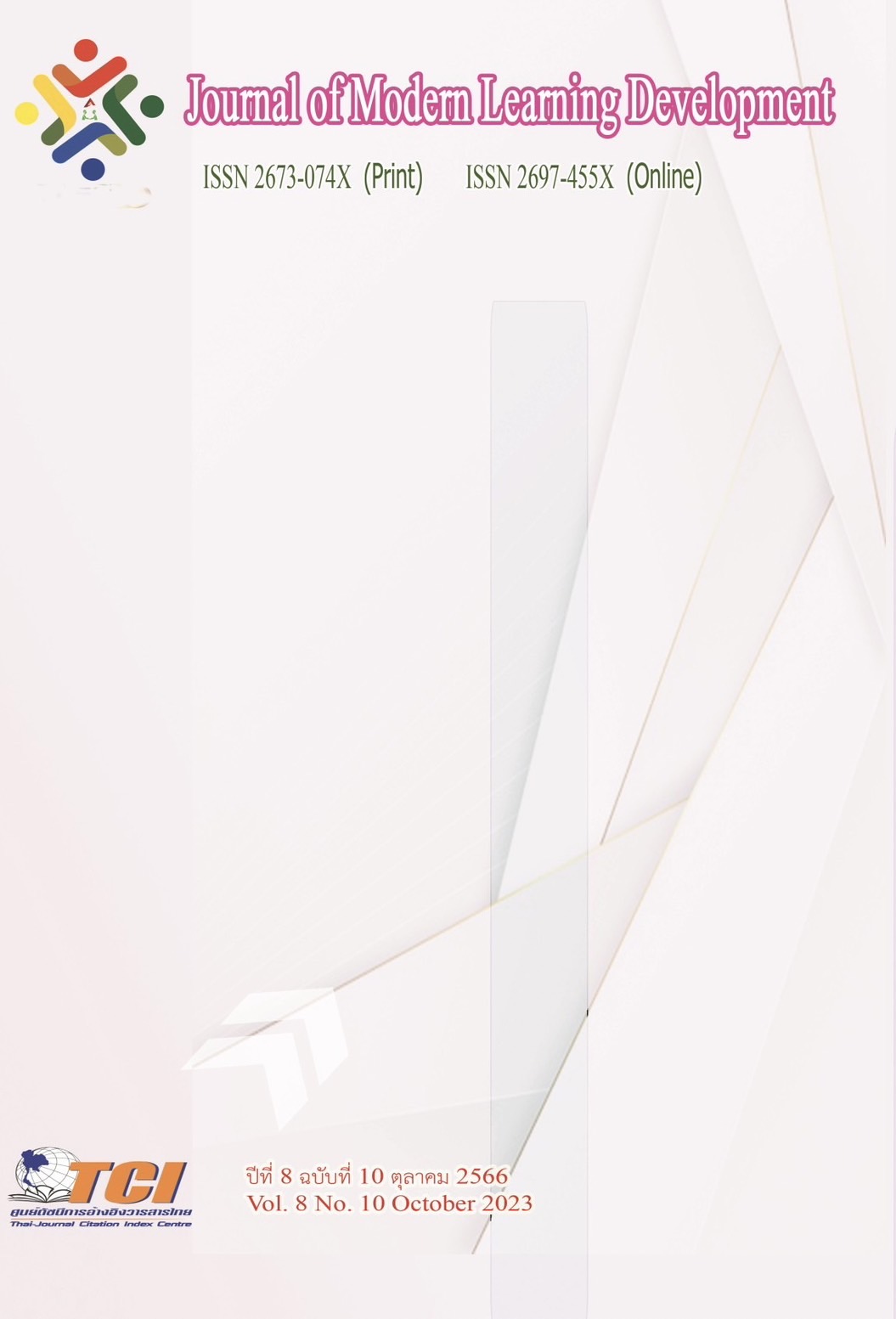The Development of Academic Achievement in the Thai Language on Word Compounding in Thai Language by Using Cippa Model Learning Management with Gamification Technique for Matthayom Suksa 6 Students
Main Article Content
Abstract
This research is to 1) to compare pretest and posttest achievement outcomes of the learning Thai language subject in the topic of word compounding in Thai language with the CIPPA MODEL learning management in conjunction with gamification technique, 2) To compare posttest achievement outcomes of the learning Thai language subject in the topic of word compounding in Thai language with the CIPPA MODEL learning management in conjunction with gamification technique and the 70% criteria and 3) to acknowledge the students’ satisfaction towards the learning management.
The samples of this research are Matthayom 6 students at Kongkrailatwittaya School. The research is conducted on the 2nd semester in 2022. There are 105 samples in 4 classes, which each room has 23 students by using a purposive sampling method.
The research instrument consists of 1) a learning management plan by using CIPPA MODEL learning management in conjunction with gamification technique, 2) the learning achievement test of the learning Thai language subject in the topic of word compounding in Thai language and 3) a students’ satisfaction survey with learning management, the methods of statistics are implemented in this research—mean, percentage, the standard deviation, as well as, t-test dependent.
Tthe results found that 1) The posttest achievement outcomes of the learning Thai language subject in the topic of word compounding in Thai language with the CIPPA MODEL learning management in conjunction with gamification technique was higher than the pretest achievement outcomes at a statistical significance of .05, 2) After learning with the CIPPA MODEL learning management in conjunction with gamification technique, the students had the outcomes of learning achievement higher than the 70% criteria with a statistical significance of .05 and 3) Students are satisfied with this learning method by using CIPPA MODEL learning management in conjunction with gamification technique with an excellent level of satisfaction. ( = 4.61, S.D. = 0.47)
Article Details
References
กระทรวงศึกษาธิการ. (2551). หลักสูตรแกนกลางการศึกษาขั้นพื้นฐาน พุทธศักราช 2551. กรุงเทพมหานคร: โรงพิมพ์ชุมนุม สหกรณ์การเกษตรแห่งประเทศไทย จำกัด.
ฐากูร บุญสาร. (2560). โปรแกรมการจัดการเรียนการสอนเพื่อส่งเสริมทักษะการทำงานเป็นทีม โดยใช้เทคนิค
เกมมิฟิเคชัน สำหรับห้องเรียนพิเศษวิทยาศาสตร์ ชั้นมัธยมศึกษา โรงเรียนกัลป์ยาณวัตรวิทยานิพนธ์
ปริญญามหาบัณฑิต. มหาสารคาม: มหาวิทยาลัยราชภัฏมหาสารคาม.
ณัฐพงศ์ มีใจธรรม. (2563). การพัฒนาผลสัมฤทธิ์ทางการเรียนภาษาอังกฤษ โดยใช้เทคนิคเกมมิฟิเคชัน
(GAMIFICATION) สำหรับนักเรียนชั้นประถมศึกษาปีที่ 5. วารสารศึกษาศาสตร์ มหาวิทยาลัยบูรพา. 32 (2), 76-90.
บุญชม ศรีสะอาด. (2560). การวิจัยเบื้องต้น. (พิมพ์ครั้งที่ 10). กรุงเทพมหานคร: สุวีริยาสาส์น.
พระมหาคชา ประณีตพลกรัง. (2561). การเปรียบเทียบผลสัมฤทธิ์ทางการเรียนวิชาภาษาไทยเรื่อง ชนิดของ
คำของนักเรียนชั้นมัธยมศึกษาปีที่ 1 โรงเรียนวัดดาวคะนองระหว่างวิธีสอนแบบซิปปา (CIPPA
MODEL) กับวิธีสอนแบบปกติ. วารสารศึกษาศาสตร์ มมร. 5 (2), 99-112.
รัสรินทร์ แพร่งสุวรรณ์. (2559). การพัฒนาทักษะการสื่อสาร กลุ่มสาระการเรียนรู้ภาษาไทย โดยใช้รูปแบบ
การสอนซิปปาโมเดล (CIPPA Model) สำหรับนักเรียนชั้นมัธยมศึกษาปีที่ 5. วิทยานิพนธ์ปริญญา
ครุศาตรมหาบัณฑิต. บุรีรัมย์: มหาวิทยาลัยราชภัฏบุรีรัมย์.
โรงเรียนกงไกรลาศวิทยา. (2564). แผนพัฒนาคุณภาพผู้เรียน 8 กลุ่มสาระการเรียนรู้ ปีการศึกษา 2564.
สุโขทัย: โรงเรียนกงไกรลาศวิทยา.
สุมาลี คำสว่าง. (2561). การจัดการเรียนรู้ด้วยรูปแบบซิปปาร่วมกับรูปแบบร่วมมือเทคนิคจิ๊กซอว์ เพื่อส่งเสริม
ผลสัมฤทธิ์ทางการเรียนวิชาภูมิศาสตร์ สำหรับนักเรียนชั้นมัธยมศึกษาปีที่ 2. วิทยานิพนธ์ศึกษาศาสตรมหาบัณฑิต. ปทุมธานี: มหาวิทยาลัยเทคโนโลยีราชมงคลธัญบุรี.


